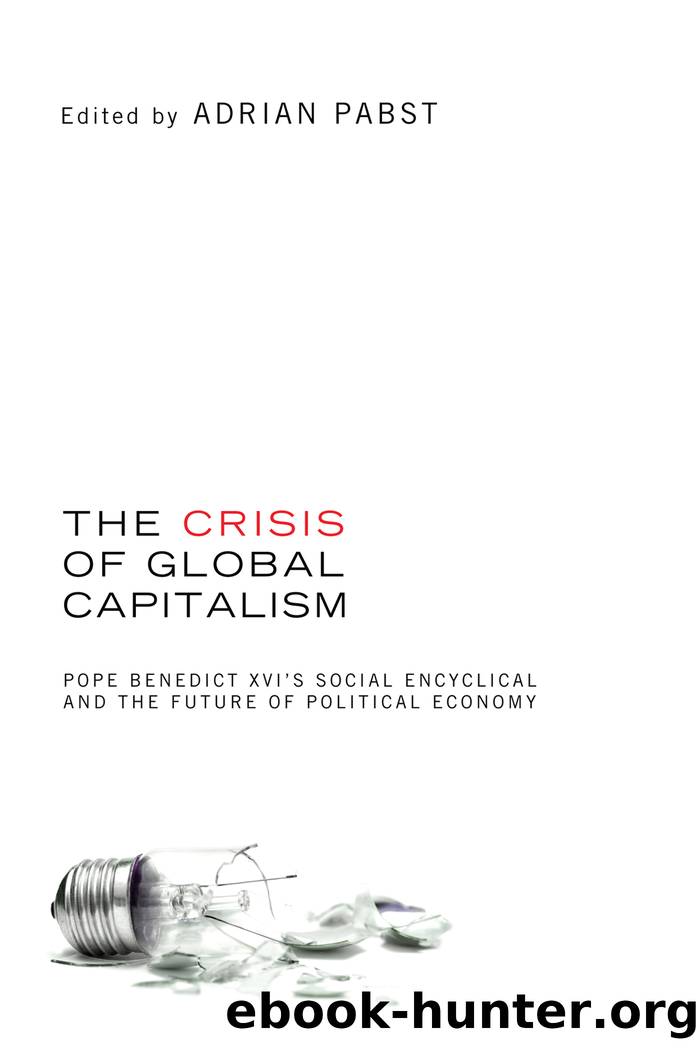The Crisis of Global Capitalism by Adrian Pabst;

Author:Adrian Pabst; [Pabst, Adrian]
Language: eng
Format: epub
ISBN: 9781621891055
Publisher: Lightning Source Inc. (Tier 3)
Published: 2014-01-27T00:00:00+00:00
Part III
Civil and Political Economy
5
Fraternity, Gift, and Reciprocity in Caritas in Veritate
Stefano Zamagni
Introduction
One of the marks of our time is a constant call for ethics, which has progressively replaced, over the past quarter of a century, the persistent call for politics typical of the 1960s, when it was imagined that âeverything was politics.â But this agreement on the primacy of ethics ceases when it comes to tangible moral issues. As Alasdair McIntyre observed in After Virtue, the apodictic use of moral principles serves only to put an end to the ethical dialogue itself. In other words, the broad convergence on ethics in public debate almost never translates into ethical consensus.
The teaching of Pope John Paul II insisted constantly on this aspect. In his speech to the United Nations on October 5, 1995, the pontiff stressed that it is possible to reach an agreement on social and political issues on a shared common basis since âthe universal moral law written in the heart of man is a sort of âgrammarâ which helps the world face the debate over its future.â1 In February 2004, in his address to the members of the Congregation for the Doctrine of the Faith, John Paul IIâafter recalling that the natural moral law can be a dialogical tool for everyoneâsaid that the main obstacle to this was âthe diffusion among faithful of an ethics based on fideism,â hence the lack of âan objective benchmark for laws, which are often based on social consensus alone.â This line of thoughtâembraced, even more strongly, also by Benedict XVIâhas in Caritas in Veritate its first complete theorization. For that matter, before becoming Pope, Cardinal Ratzinger wrote the following: âNatural law reveals to us that even nature contains a moral message. The spiritual content of creation is not only mechanical or mathematical . . . There is a surplus of spirit, of ânatural lawsâ in the universe, which is imprinted with and which reveals to us an inner order.â2
That said, in this essay I will discuss the manifestation of the principle of fraternity in economics. More specifically, I will try to answer this question: What does it mean and what does it imply, in todayâs economic systems, to embrace the fraternal principle, that is to say, the principle of reciprocity, as interpreted in Chapter 3 of Caritas in Veritate? But first it is necessary to explain properly what the principle of reciprocity is. The simplest way to do that is to compare the principle of exchange of equivalent values with that of reciprocity. The former states that whatever A does or gives to B, with whom he freely chose to start a relationship of exchange, must be counterbalanced by B doing or giving something of equal value to A. This âsomething,â in our market economies, is nothing but the market price.
This principle is subject to two main qualifications. First of all, establishing the market price logically precedes the transfer of property right from A to B. (If A wants to sell his/her
Download
This site does not store any files on its server. We only index and link to content provided by other sites. Please contact the content providers to delete copyright contents if any and email us, we'll remove relevant links or contents immediately.
| Popes & the Vatican | Roman Catholicism |
| Saints | Self Help |
| Theology |
Fangirl by Rainbow Rowell(8808)
How to Bang a Billionaire by Alexis Hall(7941)
Wonder by R. J. Palacio(7749)
The Space Between by Michelle L. Teichman(6588)
The Thirst by Nesbo Jo(6457)
Assassin’s Fate by Robin Hobb(5867)
Wiseguy by Nicholas Pileggi(5335)
The Night Circus by Erin Morgenstern(5043)
The Kite Runner by Khaled Hosseini(4963)
Paper Towns by Green John(4815)
Bittersweet (True North #1) by Sarina Bowen(4720)
Gerald's Game by Stephen King(4386)
Too Much and Not the Mood by Durga Chew-Bose(4105)
Pillow Thoughts by Courtney Peppernell(4035)
Goodbye Paradise(3463)
Twelve Days of Christmas by Debbie Macomber(3421)
Good by S. Walden(3361)
The Rosie Effect by Graeme Simsion(3223)
The Cellar by Natasha Preston(3081)
